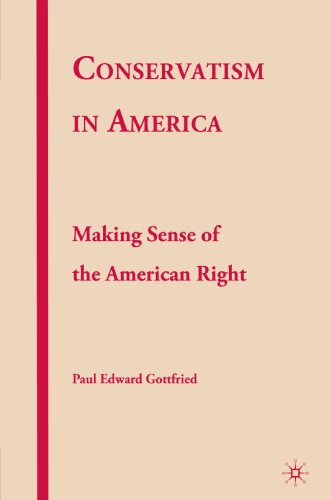Recently C. Bradley Thompson responded obliquely to my critical comments in Chronicles about his book and subsequent observations on the American Founding. Contrary to Thompson’s asides on Facebook and Twitter dismissing my criticism, I did read some of his tome, The Revolutionary Mind, and even commented on it—but I found its discussion of our state-builders so tendentious and unscholarly that after a few chapters I gave up. His attribution of recognizably Randian, agnostic, or atheistic views to the Founders was a bit much.
 The Vanishing Traditio...
Buy New $22.95
(as of 10:15 UTC - Details)
In any case, my critical analyses of Thompson’s writings are supposedly reducible to “smears” and even more ominously, to my identification with what he called the “TradCon reactionary Right.” Those on Thompson’s right remain unfit to mention, let alone deserve serious discussion from the conservative establishment, which supposedly praises Thompson as a brilliant researcher. Who am I to belittle anyone who has earned an interview on “The Dave Rubin Show” and whom National Review treats as a clubbable thinker?
The Vanishing Traditio...
Buy New $22.95
(as of 10:15 UTC - Details)
In any case, my critical analyses of Thompson’s writings are supposedly reducible to “smears” and even more ominously, to my identification with what he called the “TradCon reactionary Right.” Those on Thompson’s right remain unfit to mention, let alone deserve serious discussion from the conservative establishment, which supposedly praises Thompson as a brilliant researcher. Who am I to belittle anyone who has earned an interview on “The Dave Rubin Show” and whom National Review treats as a clubbable thinker?
This incident revealed only the most superficial tip of a gigantic iceberg, which is the conservative movement’s extensive cancel culture. Those who position themselves or are imagined to be situated even a millimeter to the right of where Conservative Inc. wants us to be at a particular moment are read out of the authorized “conservative” conversation. We are labeled the “TradCon reactionary right,” or some other equally disreputable label. As a scholar, I do not fly a “TradCon reactionary” flag. I take my information or insights wherever I find them. This means I am not dependent for my thoughts on a conservative establishment that is driven by political opportunism and the pleasure of its sponsors.
 Conservatism in Americ...
Best Price: $39.03
Buy New $37.27
(as of 10:10 UTC - Details)
This intolerant behavior on the part of the conservative establishment goes back even before the established left took up this unsavory practice. Note that in the 1950s and 1960s, it was William F. Buckley, Jr., James Burnham, and Willmoore Kendall who were scolding liberals for believing in an “open society.” Post-World War II conservatives ridiculed those who believed in the creation of an America in which all views, even those of Communists, would be heard. In my anthology The Vanishing Tradition and in my book Conservatism in America: Making Sense of the American Right, I trace back to the 1950s the conservative movement’s tendency to ostracize those who defy party lines. It was then that conservatism reconstructed itself as a crusading, anti-Communist movement that had little time for qualified Cold Warriors. Of course, there was a credible Communist threat after World War II.
Conservatism in Americ...
Best Price: $39.03
Buy New $37.27
(as of 10:10 UTC - Details)
This intolerant behavior on the part of the conservative establishment goes back even before the established left took up this unsavory practice. Note that in the 1950s and 1960s, it was William F. Buckley, Jr., James Burnham, and Willmoore Kendall who were scolding liberals for believing in an “open society.” Post-World War II conservatives ridiculed those who believed in the creation of an America in which all views, even those of Communists, would be heard. In my anthology The Vanishing Tradition and in my book Conservatism in America: Making Sense of the American Right, I trace back to the 1950s the conservative movement’s tendency to ostracize those who defy party lines. It was then that conservatism reconstructed itself as a crusading, anti-Communist movement that had little time for qualified Cold Warriors. Of course, there was a credible Communist threat after World War II.
The first to go in the transformed conservative movement of the 1950s were so-called isolationists, like libertarian scholar Murray Rothbard. These early rejections are regrettable; later the purging assumed a much grimmer aspect. By the 1980s, with the dizzying ascent of the neoconservatives, expulsions were extended to critics of a global, democratic foreign policy and other features of the neoconservative agenda. Moreover, unlike the earlier attempts to nudge out pesky dissenters, the neocons added a Communist-like efficiency to their purges.




